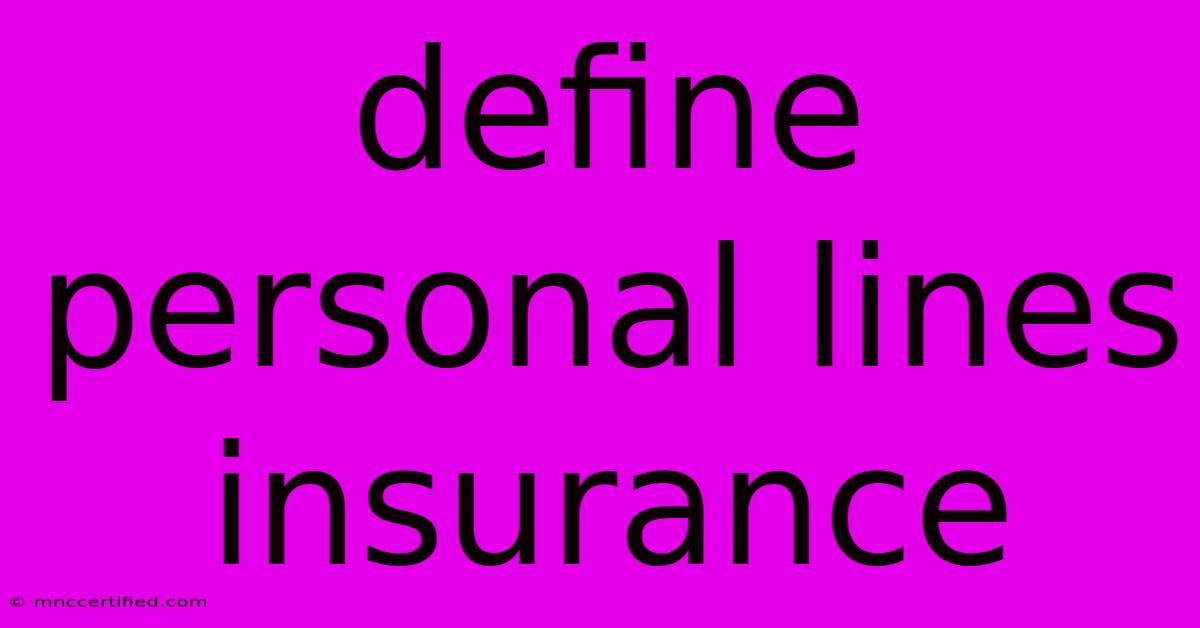Define Personal Lines Insurance

Table of Contents
Defining Personal Lines Insurance: A Comprehensive Guide
Personal lines insurance is a critical aspect of financial planning, protecting individuals and families from unforeseen events. Understanding its intricacies is crucial for securing adequate coverage and safeguarding your assets. This comprehensive guide will define personal lines insurance, explore its various types, and highlight the importance of securing the right policy.
What is Personal Lines Insurance?
Personal lines insurance encompasses a range of insurance products designed to protect individuals and their families from financial losses stemming from personal risks. Unlike commercial lines insurance which covers businesses, personal lines focus on the individual's assets, liabilities, and well-being. Think of it as a safety net for your personal life, covering everything from your car and home to your health and potential lawsuits.
The key characteristic differentiating personal lines insurance is its focus on individual needs and risks, rather than those of a corporation or business entity.
Key Features of Personal Lines Insurance:
- Individual Focus: Policies are tailored to the specific needs and assets of individuals and families.
- Broad Coverage: Offers protection against a wide array of potential losses, including property damage, liability, and personal injury.
- Accessibility: Relatively easy to obtain compared to commercial insurance policies.
- Competitive Market: Numerous insurers offer personal lines insurance, fostering competition and potentially lower premiums.
Types of Personal Lines Insurance:
Several types of insurance fall under the personal lines umbrella. Understanding the nuances of each is essential for choosing the right coverage.
1. Homeowners Insurance:
This critical policy protects your home and its contents from various perils, including fire, theft, and weather damage. It also provides liability coverage if someone is injured on your property. Key considerations include the coverage amount, deductible, and specific perils covered.
2. Renters Insurance:
Similar to homeowners insurance, but for renters, this protects your personal belongings and provides liability coverage. It's often surprisingly affordable and crucial protection against loss or damage. Consider your possessions' value when selecting coverage.
3. Auto Insurance:
This mandatory (in most jurisdictions) insurance covers damage to your vehicle and liability for accidents you cause. Different coverage levels exist, including liability, collision, comprehensive, and uninsured/underinsured motorist coverage. Choosing the right levels of coverage is vital based on your risk tolerance and financial situation.
4. Umbrella Insurance:
This provides additional liability coverage beyond what's offered by your homeowners and auto policies. It acts as a safety net for significant liability claims, offering higher limits and broader protection. Consider umbrella insurance if you have significant assets to protect.
5. Personal Liability Insurance:
This policy covers you for claims of bodily injury or property damage caused by you or members of your household, even off your property. It’s often bundled with other policies but can also be purchased separately. This is particularly important for high-net-worth individuals.
6. Health Insurance:
While often handled separately, health insurance is a crucial part of personal financial planning and falls under the broader umbrella of personal risk management. Understanding different health insurance plans and their coverage is critical.
Why is Personal Lines Insurance Important?
Personal lines insurance provides crucial financial protection against unexpected events that can significantly impact your life. The cost of repairing or replacing damaged property, paying medical bills after an accident, or defending against a lawsuit can be devastating without adequate insurance. It offers:
- Financial Protection: Shields you from the financial burden of unforeseen events.
- Peace of Mind: Provides reassurance and security knowing you're protected.
- Legal Protection: Covers legal costs associated with accidents or lawsuits.
- Asset Protection: Protects your valuable possessions and assets.
Choosing the Right Personal Lines Insurance:
Selecting the appropriate personal lines insurance requires careful consideration of your individual needs and risk profile. Factors to consider include:
- Your Assets: The value of your home, car, and personal belongings.
- Your Liabilities: Your potential exposure to lawsuits.
- Your Risk Tolerance: Your willingness to accept financial risk.
- Your Budget: The amount you can afford to pay in premiums.
By understanding the various types of personal lines insurance and carefully evaluating your individual needs, you can secure the right coverage to protect yourself, your family, and your assets. Consult with an insurance professional to discuss your specific requirements and obtain personalized advice. Remember, proactive planning is key to securing your financial future.

Thank you for visiting our website wich cover about Define Personal Lines Insurance. We hope the information provided has been useful to you. Feel free to contact us if you have any questions or need further assistance. See you next time and dont miss to bookmark.
Featured Posts
-
Premier League Newcastle West Ham Result
Nov 26, 2024
-
Insurance Direction Of Pay Form
Nov 26, 2024
-
Every Copa Libertadores And Ucl Winner
Nov 26, 2024
-
Del Reys Glasgow Stadium Show Announced
Nov 26, 2024
-
Continue Steam Deck Savings Black Friday
Nov 26, 2024